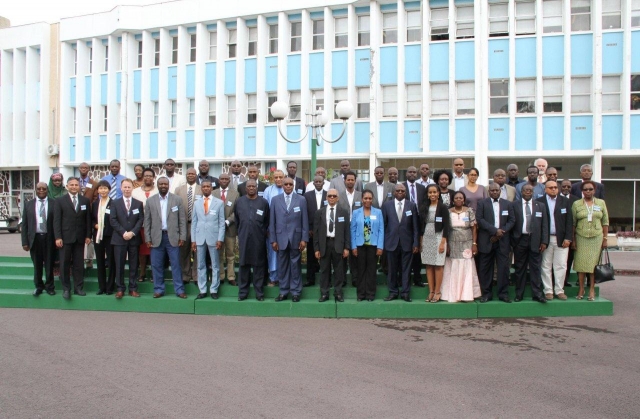Network of Public Health Emergency Operation Centers established to protect lives
 12 November 2015, Brazzaville - The need for each African country to have functional Public Health Emergency Operation Centers (PHEOCs ) that should serve as a hub to coordinate the preparedness for and response to public health emergencies to save lives, was one of the key issues discussed at a three-day meeting held in Brazzaville from 9 to 11 November 2015.
12 November 2015, Brazzaville - The need for each African country to have functional Public Health Emergency Operation Centers (PHEOCs ) that should serve as a hub to coordinate the preparedness for and response to public health emergencies to save lives, was one of the key issues discussed at a three-day meeting held in Brazzaville from 9 to 11 November 2015.
Organised by WHO, the meeting brought together public health emergency experts from 26 countries. It was also an opportunity to establish the public health emergency operations network in the Region.
While health security is considered the sovereign responsibility of Member States, the means to fulfil this responsibility are increasingly global and the Integrated Disease Surveillance and Response (IDSR) and the International Health Regulations (IHR 2005) constitute the essential vehicle for this action.
The establishment of Africa Public Health Emergency Operations Centers Network is happening at a crucial time when most countries in the WHO African region have not implemented all the core capacities, required under IHR. In order to prevent, control and respond to all PHE and emergencies, the WHO African region requires a flexible and integrated regional network of Emergency Operation Centers. Through the establishment of an Africa Public Health Emergency Operations Centers Network, countries in the Region can collectively and effectively prepare and respond to public health emergencies such as the Ebola epidemic. This network will also address the need for efficiency, coordination and availability of timely exchange of information, which has been a challenge for countries of the WHO African Region.
“A regional network of public health emergency operations centres will facilitate all countries in the WHO African Region to learn from and support each other. This landmark regional network will help to mobilize necessary resources from the region and globally, including the global emergency operations centres network (EOC-NET), to strengthen capacities of PHEOCs and in general the capacity of preparedness and response to public health emergencies in African countries,” said Dr Ibrahima-Socé Fall, the Director of Health Security and Emergencies at the WHO Regional Office for Africa.
WHO, together with partners is supporting countries in the African Region to establish and improve functional public health emergency operations centers, based on the Incident Management System.
“Where and when the next major outbreaks will occur is unpredictable. What may be more certain is that with the establishment of PHEOC and the AFRO PHEOC Network, we are sure to be better prepared, well-coordinated and hopefully the loss of lives will be minimal as our actions will be timely and professional." said Dr Amara Jambai Deputy Chief Medical Officer II, Sierra Leone.
So far, 25% of the African Region Member States have established public health emergency operations centers (PHEOC), and remaining countries are expected to follow in the near future.
________________________
For more information:
Technical contacts:
Dr Ibrahima-Socé Fall, Director of Health Security and Emergencies; Tel: +47 24139695; Email: socef [at] who.int (socef[at]who[dot]int)
Dr Nestor Ndayimirije, Regional Adviser-Epidemic, Alert, Preparedness and Response; Tel: +47 24139161; Email: Ndayimirijen [at] who.int (Ndayimirijen[at]who[dot]int)
Senait Tekeste Fekadu, Manager, Strategic Health Operations Centre, Tel: +47 24139426, Email: Tekestes [at] who.int (Tekestes[at]who[dot]int)
Media contact:
Collins Boakye-Agyemang, Regional Communications Adviser; Tel: + 242 06 520 6565; Email: boakyeagyemangc [at] who.int (boakyeagyemangc[at]who[dot]int)
Cory Couillard, Communications Officer ; Tel: 00 47 241 39995; Email: couillardc [at] who.int (couillardc[at]who[dot]int)


